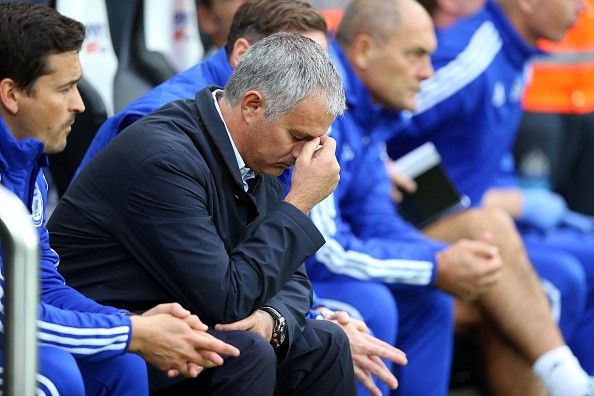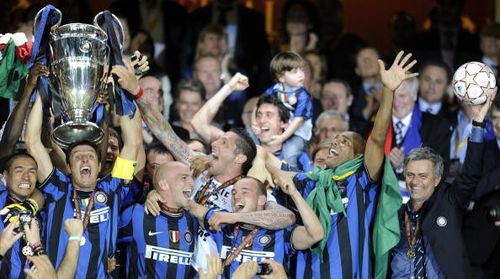
Analysing Jose Mourinho's third season syndrome at Chelsea and Real Madrid

“Envy is the biggest tribute that the shadows do to the man. Our situation is good. It’s better than anybody else’s. Everyone would love to be in our position.” – Jose Mourinho
That quote was made when Chelsea were in pole position to wrest the Premier League trophy from the hands of Manchester City last season. Ah, the wonders of the second season!
‘The Special One’ is special for a reason. Mourinho has a history of bringing success. Be it FC Porto, Chelsea, Inter Milan, Real Madrid and Chelsea again, Mourinho has a pedigree of winning trophies and one of the few to have won domestic titles in all the countries he has worked in. A tactical wizard, Mourinho always seems to have the right cards in his pocket, especially when it comes to the big crunch games. He is ‘The One’ who can always deliver on those all important trophies.
Great managers do come with the obvious weaknesses. Rigidity comes naturally to Arsene Wenger, Jurgen Klopp and Sir Alex Ferguson, who were adamant when it came to systems and players. However, Mourinho seems to escape this trend as it is difficult to find an obvious weakness. Won trophies, check. Great man-manager, check. Adored by supporters, check. No matter how hard you try it is difficult to find an obvious weakness in his managerial repertoire.
Yet, something snaps, something that always does with Mourinho. It’s been an obscurity, but his mysterious flaw is back to the fore again. The Premier League champions have started their title defence miserably, picking up just 8 points from the first seven games of the season. Billed as the pre-season favorites, a staggeringly slow start to the season has Mourinho answering the “You-know-what” theory.
Second season magician
Mourinho has always been a master of the second season and his mantra has always been to judge his team in the second season. As history suggests, Mourinho’s teams have always been spectacular and he has a knack of winning titles in his second stint.
His successes in the second season usually stem from the fact that in his first season at any club he inherits a team from the previous manager which does not bear any resemblance to the DNA of Mourinho's teams’. It is usually at the end of the first season where Mourinho handpicks in the transfer market to bring in players who are capable of adapting to his legacy.
At Porto, he managed to not sell any of his prized assets and won the Portuguese title. He also achieved the unthinkable by guiding an unfancied side to Champions League glory. At Inter in 2009, he brought in Samuel Eto'o, Diego Milito and Wesley Sneijder. That proved to be the highlight of his career when he romped Inter Milan home to a historic treble in the 2009/10 season.

At Real Madrid, he achieved similar success by bringing in Raphael Varane and Fabio Coentrao who he really needed to shore up the defence. He finally beat Pep Guardiola's Barcelona to the Spanish title, while breaking points and goalscoring records.
Last season at Chelsea he bought the charismatic Cesc Fabregas to add creativity to the midfield and a dogged gung-ho striker in Diego Costa. This was followed by the double which included winning the league and League Cup. Even in his first spell at Stamford Bridge he guided the Blues to a successive Premier League trophy mainly due to the acquisitions of Michael Ballack, Michael Essien and Salomon Kalou.
All these clubs which achieved tremendous success in his second season had hallmarks of Mourinho written all over it. Defensively rigid, organizationally as good as the Spartans (maybe even better), creative in the final third and a marauding striker to lead the ultra-strong defensive unit, Mourinho’s teams were way superior to most of the opponents in the respective leagues.
FC Porto, Chelsea, Inter Milan, Real Madrid and Chelsea all oozed exuberance from their tactical and technical foundation that Mourinho had built. More importantly the ‘Man for all seasons’ and his team were happy and that directly translated into their dominance in the domestic as well as continental championships.
“With him you learn every day,” the former Porto, Chelsea and Real Madrid defenders have said. “His second years are better than his first because the players know each other better.”
Third season syndrome
Things always go according to plan for Mourinho until the end of the second season. However, in his third season at a club, the inevitable happens. You see, happiness for most is the way of life but in the case of Mourinho it’s venom – an illusion that he always has run away from.
‘The Happy One’ has managed to finish three seasons only at two clubs, Chelsea and Real Madrid. Quite a damning statistic for a guy who knows to win titles year on year!
In his third season at Chelsea after winning back-to-back titles, ‘The Special one’ was expected to continue his magic and win more trophies. However, Mourinho had a fall out with his “then-enemy and now turned friend” Roman Abramovich over the lack of funds for signing players in the winter transfer window in his second season.
Abramovich was also turning Mourinho’s hands in playing £31 million Andriy Shevchenko that added to the furore. The final nail in the coffin appeared to be the appointment of Avram Grant as the director of football.
Mourinho was on the edge and the side that looked unstoppable a season earlier faded away faster than your regular pair of jeans. With Abramovich practically calling the shots, the team lost its aura and Mourinho’s players lost all the confidence and arrogance of title-holders. As Chelsea fizzled out over the next few games, ‘The Unhappy one’ left the club in September 2007 by mutual consent and moved on to Inter Milan.

Similarly at the Galacticos, Mourinho was expected to kick on from the La Liga title and the departure of his nemesis Pep Guardiola to greater successes. Alas, it was never meant to be. In his third season, the syndrome was in full view when Mourinho snapped completely. Known to be one of the best man-managers he lost the support of his dressing completely in that fateful third season.
That he always had a bone to pick with club legend Iker Casillas was a known fact but the fact that he started publicly maligning other players was unexplainable. Mourinho had already started orchestrating his own exit from the club by then.
Marcelo and Pepe experienced Mourinho’s public dress down when both of them were lambasted for slow recovery from injury and having an operation on an ankle mid-season respectively. A confrontation with Cristiano Ronaldo in the dressing room at the end of a cup tie led to an outburst of "F*** you" in Portuguese by Ronaldo when he scored in the next game. The mutiny of the dressing room came to the fore when Pepe publicly questioned Mourinho’s treatment of Casillas.
The side that had broken scoring records and were at their best in the title-winning season had too many hot and cold performances throughout Mourinho’s third season that saw them only achieve Copa del Rey success. With an eccentric guy like Florentino Pérez at the helm, it was just a matter of time when Mourinho was booted out of the club.

This meltdown seemed to have the necessary effect as it paved the way for him to return to a team that he always ‘loved’. Why leave at all in the first place then? An unhappy Jose is the worst internal weapon a team can possess. Chelsea and Madrid learned it the hard way thanks to Mourinho’s mood swings.
Will the syndrome bear the same end as always?
“My third season in Porto, I didn't have a third season. In Inter, I didn't have a third season. My third season at Chelsea, the first time, I won the FA Cup and the League Cup, and I played the Champions League semi-finals.
The third season in Real Madrid, I won the Spanish Super Cup, lost the Copa del Rey final, and I went to the Champions League semi-finals.” – Jose Mourinho
With a slow start at Chelsea in his third season, there are hushed questions on his syndrome rearing its head again. There is no tension, no rifts or any other baggage that comes with typical Mourinho third season. If anything, he has created an invisibility cloak around his misfiring squad by diverting all the criticism towards him.
With the domination of football in England and exploits in Europe as his USP for Chelsea in his second term, Mourinho has his eyes set on building a dynasty at Stamford Bridge.
"We are building a team for a long time, for the next 10 years. That is the objective. More important than my team is Chelsea's future."
Somehow, there seems to be a difference to the madness this time around. This is the first time Mourinho has claimed he wants to stay for as many years as possible and help his beloved team to unparalleled success. With no major club and the right job anywhere in the horizon, Mourinho would surely want to prove his critics wrong and put his biggest flaw to bed.